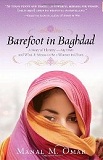
A Story of Identity - My Own and What It Means to Be a Woman in Chaos
Review posted July 22, 2011.
Sourcebooks, 2010. 244 pages.
Manal Omar knows how to work cross-culturally. She begins her book like this:
Throughout my childhood I struggled to answer the simplest of questions: where are you from? I was born in Saudi Arabia to Palestinian parents who moved to Lubbock, Texas, when I was six months old. During my childhood, my parents would uproot me every few years, from Texas to South Carolina to Virginia. Living in the American South, I was far from the image of a Southern belle, and yet the summers I spent in the Middle East only emphasized my American identity and made it clear to me that I would also never exactly be an Arab poster child.
By the time I was in high school, I had learned to embrace and love all parts of my joint identity with the fervor only a teenager could feel. I was an Arab and an American. I was a Palestinian and a Southerner. I was a Muslim and a woman. As I grew, I accepted that the emphasis on each facet of my identity would shift with the phases of the moon. Growing up in a world struggling to understand multiculturalism, I saw this ability to move among my many identities as my own secret superpower. . . .
In Iraq, I was finally able to put my superpower to full use. A wave of my American passport at the checkpoint of the fortified Green Zone allowed me access to the representatives of the U.S.-led coalition. My adherence to Muslim dress and my fluent Arabic made it possible for me to live in an Iraqi neighborhood with no armed security. This unique access allowed me to see an Iraq that was accessible to few others. With each passing season, the country would shed its skin from the past and emerge as a completely new place. Who was better positioned to adapt within a country experiencing a period of tumultuous change than someone who had been raised with an ever-shifting identity? In Iraq, I found a place with as many complicated contradictions as I had in myself. Here, though, my internal complexity was manifested in an entire society. My international colleagues were struggling to force Iraqi culture into convenient boxes, but I simply accepted its unique, fluctuating shape. International journalists marveled over the fact that women who were covered head to toe walked side by side with women with orange-colored hair and wearing tight jeans, but I simply shrugged. It was natural to me. The mosaic of identities inside Iraq was not hypocritical or schizophrenic; it was what made the country powerful.
Manal went to Iraq to work for Women for Women International.
Women for Women International focused on the most vulnerable women. This usually meant those who were the primary breadwinners in their house: widows, divorcees, or unmarried women living with elderly parents. In addition to the economic challenges, there was a social stigma attached to these women. This meant that their finding work was even more difficult.
This book tells about her experiences there, and tells stories of some of the women she met and was able to help or wasn't able to help. However, over the years she was there, the situation in Iraq deteriorated, and eventually she had to leave and base her actions from Jordan. So in that way, this book tells a sad story. Manal herself describes it this way:
Barefoot in Baghdad is not a story of the war in Iraq. It is the story of the women in Iraq who are standing at the crossroads every dawn. It is the story of my time working with Iraqis as they struggled to create a new nation and a new identity. It is informed by my years of living and working within communities throughout the country. It recounts my own experiences and the stories of the men and women I encountered, each of them players in one of the most complicated political struggles in our era. It is also a memoir of the discovery of my many identities and the strengths and weaknesses inherent within them. Finally, it is a story of finding love in the most unlikely place. As my life became intertwined with the lives of the Iraqis around me, I lost sight of where my horizons ended and theirs began. Their expectations became my expectations; their disappointments, dreams, pains, and losses became my own.
This book tells a fascinating story, and will give you insight into the lives of women in Iraq today.
